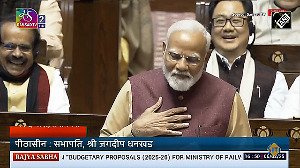Observing that the economic weight of emerging powers like China, India and Brazil gives them clout in financial and political sphere, a top United States official has said that the Obama Administration has decided to develop 'a positive-sum trajectory' with these key global players.
"A major focus of President (Barack) Obama and Secretary (of State Hillary) Clinton's early efforts have been trying to develop a positive-sum trajectory with key global players through bilateral engagement with Russia, China, Brazil, India and others, and in multilateral fora, like the G-20," Deputy Secretary of State, James Steinberg, said.
Delivering key note address at the National Defense University 2009 Symposium on 'America's Security Role in a Challenging World', he said that the emergence of these countries as key global players has been a result of widespread and unprecedented economic growth in the developing world, as well as the diffusion of technology and knowledge that has helped level the playing field.
"The current economic downturn may slow this shift, but the direction is clear. You all know the headlines: Double-digit growth in China and India; Asian companies buying up well-established American and European brands; millions of Chinese and Indians entering the middle class; central banks in China and sovereign wealth funds in the Middle East buying US Treasuries," he said.
But the story is much broader then that: new businesses springing up in South Africa and Mexico; booms in places like Brazil and Indonesia; and even strong growth in much of sub-Saharan Africa, Steinberg said.
Referring to the National Intelligence Council estimated last year, he said the so-called BRICs -- Brazil, Russia, India, China -- will have combined economic weight equal to the original G-7 nations by the middle of the century.
"That economic weight gives these emerging powers clout not only in the economic sphere, as we've seen in the recent G-20 meeting in London, and in the stalemate over the Doha trade negotiations, but also from a political standpoint, as China's resource diplomacy in Africa and South America so vividly illustrates," he said.
Their economic success facilitates their ability to play a larger security role, as they are increasingly capable of developing large, more sophisticated military arsenals. But these are still small relative to the US, he observed.
"This broad trend is not something we can change as an exercise of an American policy. There's no plausible containment model that would retard China and India's growth, although it must be said that there are policy decisions that they themselves will make about their economic and political future that can have an important impact on their trajectories," he said.
"The rise of others can be a positive- sum game. Indeed, such a result is essential if we are to tackle the great challenges of our time," he added.






 © 2025
© 2025